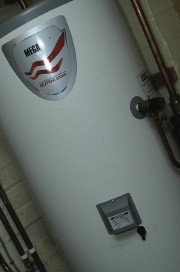Meeting the demands of the commercial market for water heating

Effective hot water for commercial applications — Heatrae Sadia reports growing popularity for its Megaflo HE unvented storage system.
Unvented hot-water storage systems, long popular in the domestic market, are growing in popularity for commercial buildings — according to Heatrae Sadia. Among the reasons are modern lifestyles and a change in consumer expectations promoting an increase in the demand for powerful showers. High-performance water delivery is important in commercial premises like leisure and sports centres, as people spending a significant amount of money on gym membership expect an invigorating shower. Similarly, people staying in an expensive, stylish hotels will expect a powerful shower and a fast-filling bath. Many office premises now also have shower rooms. For commercial applications with a significant number of showers, sinks and basins in use, a large unvented system is an ideal solution, such as Heatrae Sadia’s Megaflo HE, which is available in seven capacities from 70 to 300 l. For ease of installation, these units have 22 mm compression fittings, and all connections are colour coded and accessible from the front of the cylinder. An internal air gap and floating baffle accommodate expanded water, so there is no need for an external expansion vessel. David Webster, the company’s marketing manager, says, ‘Commercial applications like hotels and leisure centres can really improve their reputation by providing powerful hot water which the modern consumer expects.’
Related links:


